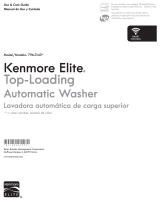
Advanced troubleshooting for service.
AUTOMATIC ELECTRONIC DIAGNOSTICS
This water softener has a
self-diagnostic function
for the electrical system
(except into power and/
or water meter). The water
softener monitors electronic
components and circuits
for correct operation. If
a malfunction occurs, an error code appears in the
display.
While an error code appears in the display, all buttons
are inoperable except the MODE/SET button.
MODE/SET remains operational so the service person
can perform the Manual Advanced Diagnostics, see
below, to further isolate the problem.
Procedure for removing error code from display:
1. Unplug transformer from electrical outlet.
2. Correct problem.
3. Plug in transformer.
4. Wait 8 minutes. The error code will return if the
problem was not corrected.
MANUAL INITIATED ELECTRONIC DIAGNOSTICS
Use the following procedures to advance the water
softener through the regeneration cycles to check
operation.
Lift off the Salt Hole Cover, remove the top cover by
unlocking the tabs in the back and rocking forward,
to observe cam and switch operation during valve
rotation.
1. Press and hold MODE/SET for 3 seconds until the
Set low salt alarm display appears, next press the
MODE/SET button five addition times until “000”
shows in the display, then release, (see Figure 19).
2. The 3 digits indicated water meter operation as
follows: If you don’t get a reading on the display,
with faucet open, pull the sensor from the valve
outlet port. Pass a small magnet back and forth
in front of the
sensor. You
should get a
reading in the
display. If you
get a reading,
shut off water
supply, unhook
the in and
out plumbing
and check the
turbine for
binding.
3.
Symbols in the display indicate POSITION switch
operation, (see Figure 19).
4.
Use RECHARGE button to manually advance the
valve into each cycle and check correct switch
operation. NOTE: Be sure water is in contact with
salt, and not separated by a salt bridge (see Breaking
a Salt Bridge section).
5. While in this diagnostic screen, the following
information is available and may be beneficial for
various reasons. This information is retained by
the computer from the first time electrical power is
applied to the electronic controller.
a. Press the
UP button to display the number
of days this electronic control has had electrical
power applied.
b. Press the
DOWN button to display the
number of regenerations initiated by the
electronic control since the code number was
entered.
6. Press and hold the MODE/SET button until the mode
FRGH+IRUWKH*;0++VKRZVLQWKHGLVSOD\
(see Figure 20). This code identifies the softener
mode. If an incorrect model code is displayed, the
softener will operate on incorrect configurations
data.
7. To change the code number, press the
UP or
DOWN button until the correct code shows.
8. To return to the present time display, press the
MODE/SET button.
9. Press the MODE/SET button to return to the present
time display. If the code was changed, make all
the timer setting. NOTE: If the control is left in a
diagnostic display or a flashing display when setting
times or hardness, present time automatically returns
if a button is not pressed within four minutes.
Call for Service
Figure 18
Switch is open
Switch is closed
Water Meter
Figure 19
Turbine
Turbine
support and
shaft
Motor
Position
switch
Valve
outlet
Sensor
housing
30
Figure 20






